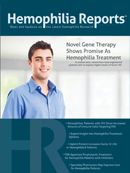Publication
Article
Hemophilia Reports
Crizotinib: A Milestone on the Path to Molecularly Targeted Treatment in NSCLC
FDA approval of crizotinib (Xalkori, Pfizer) in late August 2011 to treat anaplastic lymphoma kinase (ALK)-positive patients with late-stage non-small cell lung cancer (NSCLC) represented a three-way milestone. It was only the second time a drug was aimed at a specific subset of lung cancer patients. Crizotinib is the first targeted agent to be approved along with a diagnostic test to identify patients with an abnormal ALK gene. And the path from discovery to development to availability of crizotinib for patient care was extraordinarily rapid and efficient. It took only four years from the discovery of ALK-rearranged NSCLC for its developer, Pfizer Inc, to obtain FDA approval.1,2
A small proportion, about 3% to 5%, of lung cancers are driven by the ALK oncogene, which is characterized by a break in chromosome 2 and a re-fusion of the two genes in the opposite direction. In a review of crizotinib from discovery through development by Sai-Hong Ignatius Ou,1 the author said that anaplastic lymphoma kinase was known to be a player in cancer from an initial discovery in the 1980s of translocation in anaplastic large cell lymphoma. However, its role in a solid tumor had only just been characterized at the time the phase I clinical development program with crizotinib was launched in 2007.1
The FDA approval of crizotinib was based on results from two single-arm trials. The primary endpoint of both trials was objective response rate (ORR). Two-hundred-fifty-five patients with latestage ALK-positive NSCLC, median age 52 years, received 500 mg/day of crizotinib. Ninety-six percent of subjects in the trials had adenocarcinoma; 95% had metastatic disease; and 94% had received systemic treatment for NSCLC prior to the study. The ORR was 50% (95% confidence interval [CI],
42%-59%) in the first trial and 61% (95% CI, 52%-70%) in the second. Median duration of response was 41.9 weeks and 48.1 weeks, respectively.2
The most common adverse events were vision problems, nausea, diarrhea, vomiting, edema, and constipation. The FDA issued warnings and precautions for pneumonitis, liver enzyme abnormalities, and QT interval prolongation.2
FDA approval of crizotinib occurred under the agency’s accelerated approval program because of the drug’s ability to treat a serious disease, based on clinical data showing that crizotinib is likely to create a clinical benefit for patients.3
In a study presented at the 14th World Conference on Lung Cancer in Amsterdam in July 2011, and at American Society of Clinical Oncology (ASCO) annual meeting in 2011, investigators presented early phase II results from the single-arm, open-label PROFILE 1005 trial. In it, 51% of 133 patients who had undergone prior chemotherapy who were treated with crizotinib exhibited an overall response, including one patient who experienced a complete response. At 12 weeks into the trial, the disease control rate was 74%, meaning that a proportion of participants achieved stable disease, or partial or complete responses.4
Two phase III trials comparing crizotinib and chemotherapy are ongoing. PROFILE 1014 compares crizotinib with standard chemotherapy pemetrexed plus cisplatin or carboplatin in previously untreated patients with ALK-positive NSCLC. The primary endpoint is progressionfree survival, and patients who are randomized to chemotherapy are permitted to cross over to crizotinib upon disease progression. PROFILE 1007 is comparing crizotinib with pemetrexed or docetaxel second-line in patients with ALKpositive NSCLC. The primary endpoint of this trial is also progression-free survival.1
Research also continues with the goal of elaborating on other therapeutic extensions of crizotinib in NSCLC. Investigations are under way to assess the properties of crizotinib as a multi-targeted receptor tyrosine kinase inhibitor, particularly a potential therapeutic role arising from activity of the MET (mesenchymal-epithelial transition) gene.1
At the same time, work is under way to combat the development of crizotinib resistance in NSCLC patients, which typically develops after one year.
References
1. Ou SH. Crizotinib: a drug that crystallizes a unique molecular subset of non-small-cell lung cancer. Expert Rev Anticancer Ther. 2012;12(2):151-162.
2. Xalkori [package insert]. New York, NY: Pfizer; 2011.
3. U.S. Food and Drug Administration (FDA). FDA approves Xalkori with companion diagnostic test for a type of late-stage lung cancer. Available at: http://www.fda.gov/NewsEvents/Newsroom/PressAnnouncements/ucm269856. htm Accessed March 29, 2012.
4. Crinò L, Kim D, Riely GJ, et al. Initial phase II results with crizotinib in advanced ALK-positive non-small cell lung cancer (NSCLC): PROFILE 1005. American Society of Clinical Oncology 2011 Annual Meeting. J Clin Oncol. 2011;29(suppl; abstr 7514).





